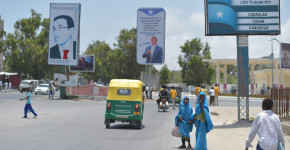Somalia’s capital city Mogadishu readies for the 2016 electoral process
Mogadishu, 27 September 2016 – The quiet Somali capital is now a hub of electoral activity as the country readies for a more inclusive electoral process that will demonstrate its commitment to democratic reforms. This year’s electoral process promises to be a competitive race, as dozens of local and diaspora Somalis enter the arena.
The biggest focus is on the presidential race, where incumbent President Hassan Sheikh Mohamud and Prime Minister Omar Abdirashid Ali Sharmarke are also having a go at the presidency.
Others are former President Sheikh Sharif Sheikh Ahmed; former Puntland President Abdirahman Mohamed Farole, a female candidate Fatuma Dayib; media owner Yassin Mahi Mallin; former Somali Ambassador to Kenya Mohamed Ali Nur ‘Ameriko’; former Mayor of Mogadishu Mohamed Ahmed Nur Tarsan and Jabril Ibrahim Abdulle.
Some Mogadishu residents expressed optimism about the process as they voiced their expectations of future leaders.
“I am hopeful about the future and that the electoral process will usher in development. Since I was born, I have never known what peace means in Somalia. We hope for an elected President who will initiate development and investment in education, make scholarships available for students and create more jobs for the youth,” Aliza Mohamed Ibrahim, a student at City University in Mogadishu said.
“We hope that after the elections, our livelihoods will improve and job opportunities will increase,” Ali Osman, a cart pusher stated.
Mohamed Mohamud Gure, an aspiring member of parliament for Galmudug region says if elected, he hopes to use his position to fight corruption
“I want to be the voice of the people. Presently, I realise there is no accountability and corruption is rife. I want to be the member of parliament who will speak for the people and represent their views, hold the government accountable and monitor service delivery,” Mr Gure said.
On Monday, Somalia’s Federal Indirect Electoral Implementation Team (FIEIT), the body overseeing the process, announced a new electoral calendar pushing back the voting for a month. Following the election of a lower and upper house of parliament in mid October, a presidential election will be held on 30 November 2016.
FIEIT chairperson Omar Mohamed Abdulle ‘Dhagey’ attributed the delay to logistical and political glitches.
“FIEIT and SIEIT convened to look back at the progress made on the electoral process, what we could not achieve was the time needed to bridge those obstacles that are present in order to complete the process, “ Dhagey told journalists at media briefing.
Dhagey also said that an Election Dispute Resolution Mechanism, a vital part of the process, had not yet commenced work.
“Some traditional elders haven’t yet completed submission of a list of delegates,” he added.
Somalia’s 2016 electoral process will see 14,025 delegates vote in a Lower and Upper House of Parliament, who will in turn elect a president.
The country is expected to hold a true universal ballot in 2020.
